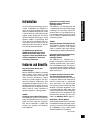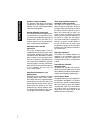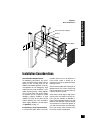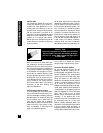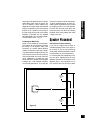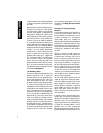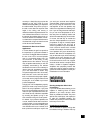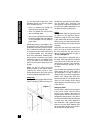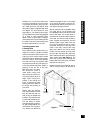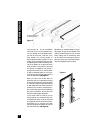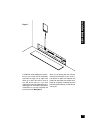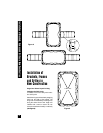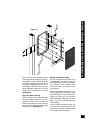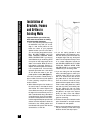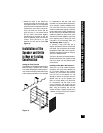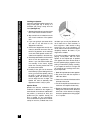
Whenever you run the wire further than
four and one half feet from a hole in a stud
or joist (open attic space, going up walls,
etc.), fasten the wire to the joists or studs
using cable clamps or appropriately sized
wire staples. The wire should not have
large sags in it, nor should it be too tight.
Try to protect the wire from being stepped
on in attics or other unfinished crawl
spaces. There are guard strips, raceways
and conduits which can be used to protect
the cable. Consult the local building code
for special requirements in your area.
Concealing Speaker Wire
in Existing Walls
This is actually a fairly simple task if you
restrict your choice of speaker locations
and wire routes to the interior walls or ceil-
ings of your home. Interior walls in almost
all North American residences are hollow,
so that it is easy to flush mount speakers
into them and route new speaker cable
around the house. What you see when you
look at the painted wall board, plaster, or
paneling is only the skin of the wall.
Behind the skin is the skele-
ton; two-by-four wood or
metal “studs” running verti-
cally from the floor to the ceil-
ing in walls and two-by-six or
larger “joists” running hori-
zontally in the ceilings and
floors. In between the studs
and the joists is the space for
the wiring and plumbing of
your home.
Exterior walls are different.
They must insulate the house
from the heat and cold out-
side, so they are stuffed with
insulation. The national build-
ing code requires that the hol-
low wall space in exterior
walls be broken by a horizon-
tal stud placed between the
vertical studs. This “fire block-
ing” makes it very difficult to
retrofit long lengths of wire. In some areas
of the country the exterior walls are con-
structed of solid masonry, and have no hol-
low space for speakers or wires.
Start by examining all the possible routes
you might take to run the speaker wire
from the speaker to the volume control and
back to the stereo. Use a stud sensor or
other device to locate the internal structure
of the wall. You want to avoid all studs or
joists. A typical route would be: from the
speaker location up the inside of the wall
to a new hole drilled into the top “plate”
(horizontal two-by-four at the top of the
inside of the wall), into the attic crawl
space, then down to the volume control
location through another top plate, back
up to the attic, across the attic, and finally
down another plate to the wall behind the
stereo system itself (See Figure 4). The
other very common route is through the
bottom plate of the wall into an unfinished
basement or crawl space.
Identify where all of your electrical, phone,
and TV wiring is likely to be and plan to
Installation Fundamentals
9
Figure 4
Speaker
Location
Volume
Control
Location
Stereo
Location



